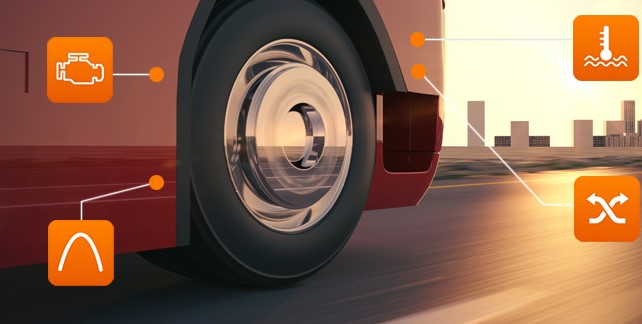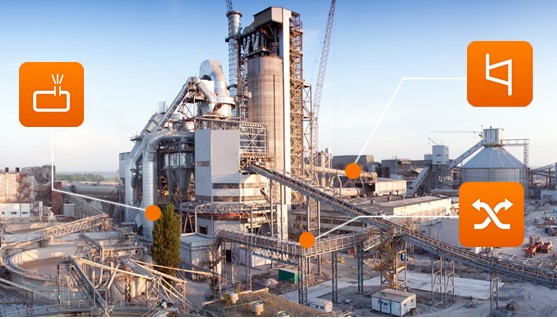
 Modelica libraries from Modelon deliver state-of-the-art models for a wide range of industries, accelerating development time and enabling easy integration with different application domains.
Modelica libraries from Modelon deliver state-of-the-art models for a wide range of industries, accelerating development time and enabling easy integration with different application domains.
Modelon develops its libraries in close cooperation with leading industry partners. The libraries are updated continuously to reflect evolving industry needs, to implement the latest developments in Modelica tools and standards, and in response to customer requests.
Benefits of Modelica Libraries

- Enable customers to focus on core business instead of spending time and resources modeling physics from scratch.
- Accelerate the development process by making models available early in the design process.
- Provide access to validated models representing many years of development efforts by domain experts.
- Deliver open standards flexibility and portability, allowing customers to customize models for individualized needs and to easily integrate into existing applications.
The Air Conditioning Library is used to design, analyze and optimize automotive air conditioning systems during early design stages. It comes with both ready-to-use refrigeration cycle templates and a wide range of components to create non-standard configurations. Predefined steady-state experiments and an interface to Microsoft Excel enable users to conduct experiments to calibrate and validate design options and component settings. A dynamic system model provides the means for investigating charge optimization and control design. The library can be used as an integrated part of energy management design for both conventional and hybrid vehicles by combining with libraries for electric power, batteries and powertrain. Liquid cooling models comprising heat exchangers and other coolant equipment are available as a free add-on.
The Electric Power Library is ideal for efficient modeling, simulation and analysis of electric power systems, including AC three-phase (abc, dq0, rst) and one-phase AC and DC systems. The models can be used in both steady-state and transient mode for simulation and initialization. The library's components provide standardized interfaces to thermal and mechanical domains, and are easy to combine with other libraries to represent electric power and actuation. Application domains include power stations and rail vehicles.
The Engine Dynamics Library is used for combustion engine systems modeling, simulation and analysis, including engine to intake/exhaust flow paths, intercoolers, turbochargers, and EGR-loops. Pressure and thermal dynamics of the complete air and exhaust gas exchange are explicitly modeled. Several turbocharger and EGR configurations can be modeled, including variable geometry turbine designs. The library is well suited for creating models used in transient engine response and related engine control. Typical applications for Engine Dynamics Library include control design, analysis of transient engine performance, and transient emissions studies. The library has been successfully deployed in industry for developing models and controls a complete engine system, including diesel after-treatment systems.
Environmental Control Library
The Environmental Control Library is used for aircraft environmental control systems analysis and design. The library is designed to study energy consumption and thermal conditions that affect the level of comfort for passengers and crew. These performance aspects are driven by large variations in ambient conditions such as humidity and temperature. The models provided by Environmental Control Library account for these effects through first principles and fully support bidirectional flow. The library has been developed internally at Modelon for a number of years together with a European airframer, and starting with version 3.1 it is publicly available. Modelon is now able to offer out of the box a library reinforced through industrial collaboration deployment. The library provides an efficient and numerically robust framework suitable for large-scale complex systems. Component models include heat exchangers, compressors, turbines, ejectors or jet pumps, water separator, valves, cabin and pipes.
The Fuel Cell Library is used to model, simulate, analyze and control fuel cell design, especially for PEMFC (Polymer Exchange Membrane) and SOFC (Solid Oxide) systems. It contains the essential components needed to research, design and configure fuel cell systems, including components, subsystems, templates and media. The flexibility of the tool, the extended code, and examples implemented in the library make it easy to get started and useful in a wide range of applications.
The Fuel System Library is used for design and verification of fuel systems on civil and military aircraft. The library is designed to analyze and verify the system behavior during various dynamic operating modes and flight conditions. Aircraft are characterized by large variations in acceleration and orientation. The Fuel System Library provides simulation results accounting for these effects on fuel-air mixtures and includes full support of bidirectional flow. Fuel System Library has been developed internally at Modelon for a number of years together with a European airframer; starting with version 3.1, it is now publicly available. Modelon is therefore now able to offer a package hardened through industrial program deployment. The models have been designed to be numerically robust and can handle large-scale complex systems. Component models include ejectors, pumps, tanks, valves and pipes.
The Heat Exchanger Library is used for heat-exchanger design and analysis. Key features involve the capabilities to achieve optimal positioning of heat-exchangers in respect to each other and to perform stacking analysis. The library contains heat exchanger models supporting several flat-tube and louvered fin designs. Users can simulate inhomogeneous airflow, temperature distribution and heat-exchanger stacking along the airflow path.
The Hydraulics Library is valuable for all industries that develop hydraulic components and applications, including automotive, aerospace and industrial equipment. The Hydraulics Library provides models of pumps, motors and cylinders, restrictions and valves, hydraulic lines, lumped volumes and sensors. No special components for splits or mergers are required -- users connect hydraulic components by simply drawing connection lines, making it easy to model non-standard configurations and component designs.
The Hydro Power Library provides a framework for modeling and simulating hydro power plant operations, enabling users to study multiple plant designs and their dynamic behaviors in the early concept design phase. The library offers a complete testing and tuning environment to attain optimal performance that will translate into real-world operations. It is also ideal for simulating transient operations, such as start-up and load rejection, to verify that the control system handles those scenarios properly.
The Liquid Cooling Library is used for modeling and simulation of liquid cooling systems for virtual prototyping, component dimensioning and control design. The library includes more than 80 internal flow components such as pipes, bends and junctions with predictive geometry-based flow resistance correlations. It also includes generic components that can be calibrated from measurement data. More than twenty fluid models are provided in the library, with temperature-dependent properties to support cooling system modeling for water, customizable glycol-water and alcohol-water mixtures, every relevant water-salt mixture (e.g. potassium carbonate), calcium chloride, sodium chloride, potassium acetate, etc. The library also contains SAE oil model and even jetfuels. Pre-configured templates guide users in creating simplified, high-performance heat exchanger stack models with 3D visualizations for parameter verification and presentation of resulting temperatures. The Liquid Cooling Library can be used effectively in conjunction with geometry-based models from the Heat Exchanger Library.
The Pneumatics Library is used to verify and optimize the design of complete pneumatic systems throughout a product lifecycle. Applications include suspension and brake systems, machine tools, heavy-duty pneumatic tools such as jackhammers, impact wrenches and drills. The Pneumatics Library provides components for modeling cylinders and motors, valves and nozzles, lumped volumes, lines and sensors. Specially designed components can be modeled by modifying library components and users can easily connect components to create non-standard configurations.
The Thermal Power Library provides a comprehensive modeling and simulation framework for thermal power plant operation. The library is ideal for control system development and verification, e.g. in developing control strategies to cope with rapid load changes brought on by the increasing use of renewable energy sources. The Thermal Power Library is able to capture behavior of transient operation and control for events such start-up and load rejection. A particular advantage of the library is the ability to simulate dynamic as well as steady-state behavior using the same model. Another advantage is that it covers the entire steam cycle. Thermal Power Library can also be used for modeling and simulation of the flue gas, including a wide range of after-treatment technologies such as desulphurization, NOx-removal and carbon capture and storing (CCS). The Thermal Power Library allows multiple design and dynamic behavior studies in the early concept phase, saving time and helping to ensure greater quality.
The Vapor Cycle Library is used to design vapor cycle systems for heating, cooling and waste-heat recovery. The library enables component interaction and dynamic system behavior to be simulated and analyzed at an early design stage. It can be used as an integrated part of energy management design for both mobile and residential applications. The Vapor Cycle Library is fully compatible with the Liquid Cooling Library, Heat Exchanger Library and other Modelica libraries that cover mechanical and electrical parts of the system, such as the Electric Power Library. Using several libraries together the user gets a powerful, inter-disciplinary simulation and analysis environment, ideally suited for complex design tasks.
The Vehicle Dynamics Library provides an open and user-extensible environment for full vehicle and vehicle subsystem analysis. Designed with a hierarchical structure and an extensive library of predefined vehicle components, the configuration of any class of wheeled vehicle - cars, trucks, motorsport vehicles, heavy vehicles - is convenient and straight-forward. The library allows you to optimize and verify the design of your vehicle systems from the early design phases through control design and implementation. It is unique in that it provides true multi-body, multi-domain simulation with real-time performance, and model export capabilities allowing distribution across your organization.



 Modelica libraries from Modelon deliver state-of-the-art models for a wide range of industries, accelerating development time and enabling easy integration with different application domains.
Modelica libraries from Modelon deliver state-of-the-art models for a wide range of industries, accelerating development time and enabling easy integration with different application domains.